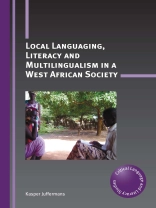This book aims to enhance and challenge our understanding of language and literacy as social practice against the background of heightened globalisation. Juffermans presents an ethnographic study of the linguistic landscape of The Gambia, arguing that language should be conceptualised as a verb (languaging) rather than a countable noun (a language, languages). He goes on to argue that sociolinguistics should not be defined as the study of ‘who speaks what language to whom, and when and to what end’ (as Fishman defined it), but as the study of who uses which linguistic features under particular circumstances in a particular place and time. The book is therefore in part an exercise to unpluralise language, which Juffermans argues is necessary for a more realistic understanding of what language is, what it does, and what people do with it. The book will be of interest to sociolinguistics researchers, especially those focusing on Africa and the global South.
Inhoudsopgave
1. How many Languages do you Speak?
2. Gambia’s Local Languages
3. Englishing and Imaging in the Linguistic Landscape
4. Voices on English and Local Languages in Education
5. Collaborative Literacy Repertoires
6. Writing Mandinka in the Presence of English
7. Local Language and Literacy Regimes
Over de auteur
Kasper Juffermans has held doctoral and postdoctoral positions at the Universities of Hong
Kong, Tilburg, Hamburg and Luxembourg and was a visiting professor of linguistic
anthropology at Ghent University, where he also obtained his first degree in African Studies. He is the author of Local Languaging, Literacy and Multilingualism in a West African Society (Multilingual Matters, 2015) and most recently co-edited The Tyranny of Writing: Ideologies of the Written Word (Bloomsbury, 2018, with Constanze Weth). Kasper is currently (loosely) affiliated with the University of Curaçao.












